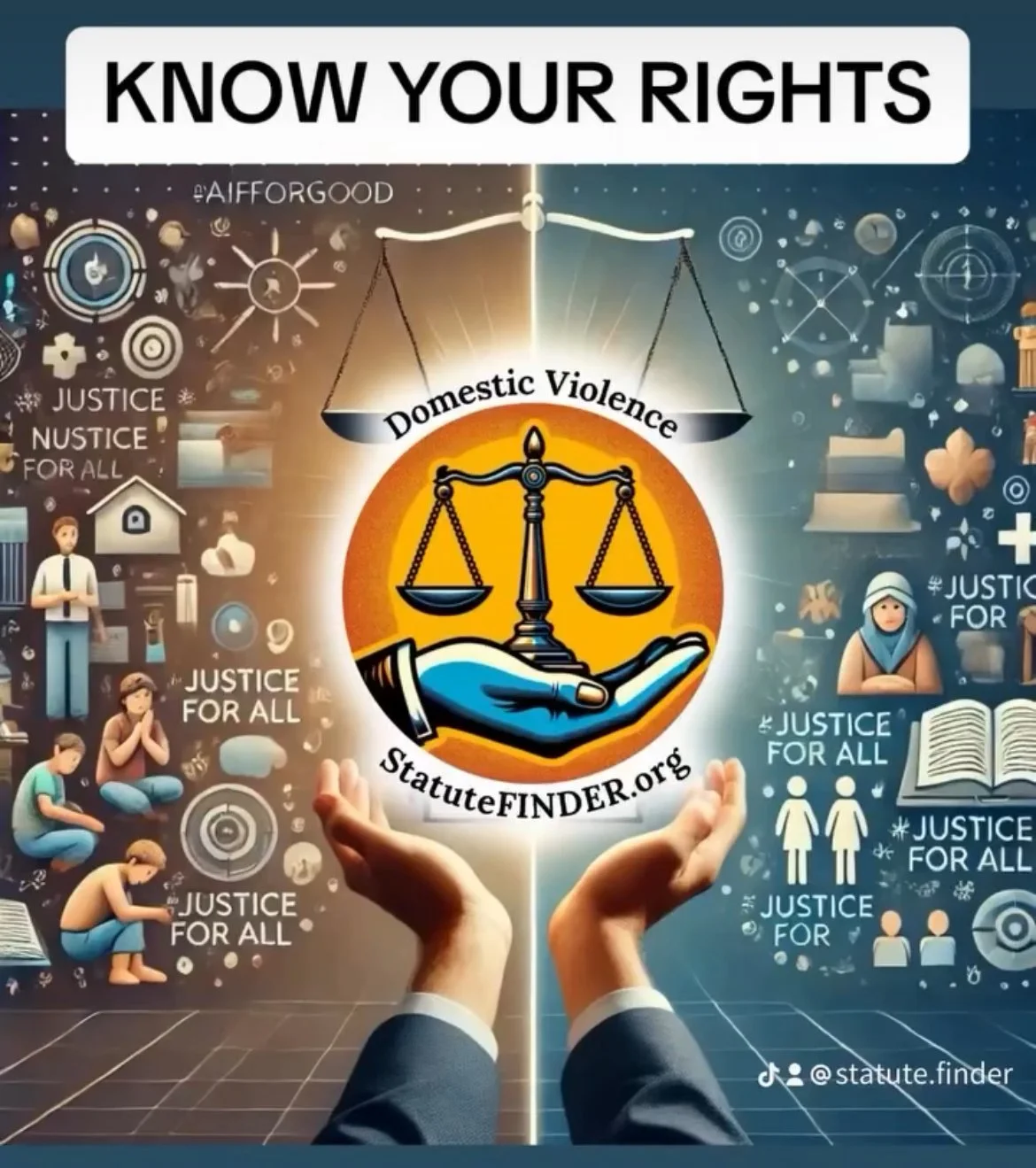Access to Justice: Why So Many Can’t Afford Legal Help—And How Can StatuteFINDER Help Domestic Violence pro se for free
Learn how domestic violence survivors can self-represent themselves in court, get legal aid, and how the app StatuteFINDER gives you access to affordable & free legal services in 2025.
As of September 28, 2025.
Introduction
For millions of people who need legal advice in cases such as wrongful termination, custody cases, or landlord conflicts. Not being able to afford a lawyer is just a reality for most.
Ideally, justice should be guaranteed no matter their background or income, but for many people, it’s too expensive to afford a lawyer to defend them in court. However, StatuteFINDER can be a useful tool, enabling you with the power to help yourself when in need of inexpensive legal resources. StatuteFINDER harnesses artificial intelligence technology to allow you to explain your problem, and the app finds laws/statutes that can be beneficial for your situation.
Let’s dive deeper to understand why legal help is out of reach for many American citizens and what has been done to fix this imbalance.
1) The Legal System is Difficult to Navigate Yourself
In Latin, the term “Pro se” means "on one's behalf”. In context, it refers to representing yourself in court without an attorney’s assistance; unfortunately, many people become uncomfortable in a courtroom setting because they aren’t knowledgeable about legal terms or are unfamiliar with structured rules and procedures.
If something being misunderstood, a mistake being made, or a deadline being missed could potentially disrupt the entire case.
The gap between knowledge and confusion is widening. Many people lack the necessary resources and may be walking into a courtroom blissfully unaware of how to defend themselves.
Technology is evolving at an exponential rate, and artificial intelligence is expanding the playing field for people struggling to catch up to the constantly changing legal system. That said, apps like StatuteFINDER help you navigate the legal system and understand the legal language better, making you feel empowered by allowing you to understand your rights.
2) The Legal Systems' High Costs
The price to hire a lawyer can leave you racked up with thousands of dollars in legal fees, as many lawyers can cost hundreds of dollars per hour.
This is a clear disadvantage for lower-income individuals, who may already struggle to afford food or pay rent.
Unfortunately, income disparities may often cause an imbalance of power in court, given one’s ability to afford legal representation, and there is no promise that they will have access to a good legal representative.
3) Technology Is Helping: But It’s Not Enough
Apps like StatuteFINDER have been beneficial for hundreds of domestic violence survivors in filling the cracks of issues regarding legal help accessibility. With the aid of StatuteFINDER, it can help your confidence in the courtroom by offering access to chat-based legal resources (not legal advice) and step-by-step guides, so it can help you find laws relevant to your situation.
Even with the help of technology, it can not replace the insightful strategy and support that a trained attorney offers, especially in complicated or high-pressure cases.
4) Impact on Minority Communities
The justice system has lacks legal resources for those living in low-income households and is disproportionately affecting people of color, immigrants, and disabled individuals.
Minority groups are most likely to face civil legal issues; however, they are less likely to be able to resolve legal issues because they cannot afford a lawyer.
Without legal representation, minority groups risk losing custody of their children, their homes, or the assurance of a fair trial.
5) Legal Aid Can’t Meet the Demand
As stated by the Legal Services Corporation, more than 90% of low-income Americans obtain mediocre or no legal assistance for their civil legal troubles. Help is available to low-income people in need of legal aid, and some organizations even offer low-cost or free legal assistance.
However, they’re overburdened and insufficiently funded. These organizations have no choice but to turn away suitable clients just because they don’t have the staff or resources to help them all.
6) What Can Be Done?
Improving access to justice demands structural change. Here are a few ideas:
Volunteer your skills or make donations to court-operated legal aid centers.
Develop more technology, such as StatuteFINDER, to make legal resources more accessible.
Offer limited legal advice (such as *document review) from certified professionals who aren’t attorneys.
Boost funding for legal assistance programs and public defenders.
Make legal procedures clearer and make forms easier to use.
* a phase of the lawsuit and legal process
Final Thoughts: Justice Shouldn’t Depend on Your Wallet
It’s a right to have the opportunity for equal justice; however, when legal assistance is a luxury, that promise feels empty.
By generating funds, promoting awareness, and encouraging innovation in legal services technology, we can come closer to a system where justice truly is available to everyone and not just to those who can afford it.
If you want to learn more about StatuteFINDER or how to use the StatuteFINDER app, click the video below:
Guest Author: Brenda Gallello
Brenda Gallello is a passionate law student pursuing her passion in criminal and civil law. She actively participates in debates, volunteers in a political campaign, and aspires to learn more about criminology and psychology.
Works Cited
Harvard Law Review. “Civil Gideon and the Right to Counsel in Civil Cases.” Harvard Law
Review, vol. 122, no. 4, 2009, pp. 1067–1080.
Legal Services Corporation. The Justice Gap: The Unmet Civil Legal Needs of Low-Income
Americans. April 2022, https://www.lsc.gov/justice-gap.
National Center for State Courts. Justice for All: Civil Justice in the United States. National
Center for State Courts, https://www.ncsc.org/.
Pew Charitable Trusts. How Legal Technology Is Reshaping the Civil Justice System. 2021,
https://www.pew.org/-/media/assets/2021/12/how-courts-embraced-technology.pdf



